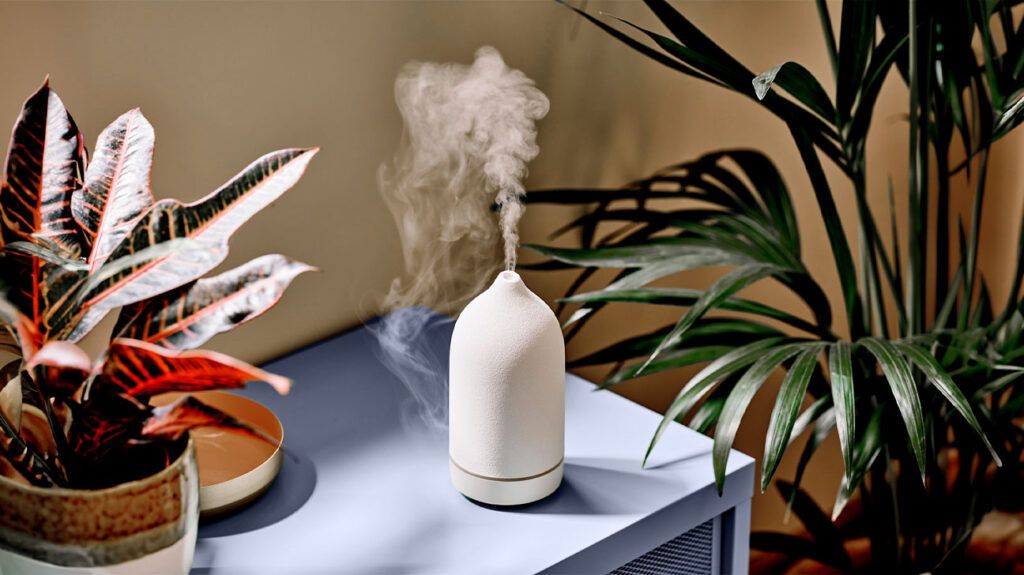Humidifiers add moisture to the air and can help manage symptoms of asthma. They do so by keeping the air at the right humidity level.
Dry or humid air can worsen asthma over time. Asthma is a chronic respiratory condition that affects the airways in the lungs, making it harder for air to flow out.
Various environmental factors, such as humidity levels, can exacerbate or trigger asthma. To avoid this, many individuals turn to humidifiers — devices that increase moisture levels in the air.
This article examines the potential benefits and considerations of using humidifiers for asthma relief, the difference between humidifiers and dehumidifiers for asthma, and some frequently asked questions.

Certain asthma triggers, such as pollen, air pollution, and cold, dry air, can set off or worsen asthma symptoms. When symptoms get worse, a person
Humidifiers increase moisture levels in the air and can potentially provide relief for people with asthma. However, the effectiveness of humidifiers in managing asthma symptoms varies from person to person and depends on several factors.
One potential benefit of using a humidifier for asthma is its ability to alleviate dryness in the airways by introducing moisture into the air.
Dry air can lead to symptoms such as:
It is crucial to note that excessive humidity can also pose risks for people with asthma. According to the Environmental Protection Agency (EPA), it is best to maintain indoor humidity levels between 30% and 50%.
Before incorporating a humidifier into an asthma management plan, it is essential to consider certain precautions. This includes the following:
- Cleanliness: People must clean their humidifiers regularly to
prevent the buildup of mold, bacteria, and other harmful microorganisms. Failure to maintain proper hygiene can lead to respiratory infections and worsen asthma symptoms. - Humidity control: Avoid excessive humidity levels, as they can foster the growth of mold, mildew, and dust mites, all of which are known triggers for asthma attacks.
- Allergen management: Incorrect use of humidifiers can exacerbate asthma symptoms. Ensure the humidifier does not harbor allergens or contaminants that could trigger an asthma attack.
When selecting a humidifier for asthma, consider the following features:
- Adjustable humidity settings: Opt for a device with adjustable humidity settings or an automatic timer feature to maintain optimal moisture levels in the environment.
- Easy cleaning and maintenance: To prevent the buildup of harmful microorganisms, choose a device that is easy to clean and maintain.
- Built-in filters: Look for humidifiers with filters that trap airborne allergens and pollutants, reducing the risk of asthma triggers.
Find out more about the best humidifiers for the home and office.
High levels of humidity can also exacerbate asthma symptoms. While humidifiers add moisture to the air, dehumidifiers remove excess moisture, which can also benefit individuals with asthma.
The choice between a humidifier and a dehumidifier depends on a person’s specific needs and the humidity levels in the environment.
Dehumidifiers may be more suitable for controlling mold and allergen growth in humid climates. On the other hand, humidifiers may be beneficial in dry climates or during the winter months when indoor air tends to be drier.
Ultimately, improving indoor air quality is the goal. People should keep this in mind when deciding on the right device for them. If indoor air pollution worsens an individual’s asthma symptoms, it is important to speak with a healthcare professional.
Should I use a humidifier if I have asthma?
Some people with asthma may benefit from using a humidifier. Even with a humidifier, they will still need to monitor humidity levels and ensure the device is well-maintained to avoid exacerbating asthma symptoms.
What type of humidifier is best for asthma?
While most humidifiers have the same basic function, several different types exist. People with asthma may opt for ultrasonic or evaporative humidifiers because they produce cool mist and effectively add moisture to the air without introducing heat or potentially harmful minerals.
Do humidifiers help with breathing problems?
Humidifiers can help ease breathing difficulties caused by dry air, but they may not be suitable for all respiratory conditions. Consult a healthcare professional before using a humidifier for respiratory relief.
Which is better for asthma, a humidifier or an air purifier?
Both devices can help manage asthma symptoms by improving indoor air quality. While humidifiers add moisture to the air, air purifiers filter out airborne allergens and pollutants.
Depending on individual needs, combining both devices may provide the most comprehensive asthma relief.
Humidifiers have the potential to offer relief for individuals with asthma by maintaining optimal humidity levels in the home environment. However, it is essential to exercise caution. Select a device with adjustable settings and ensure the device is well-maintained to avoid exacerbating asthma symptoms.
Consulting a healthcare professional can help determine whether incorporating a humidifier or dehumidifier into an asthma management plan is appropriate and beneficial.
